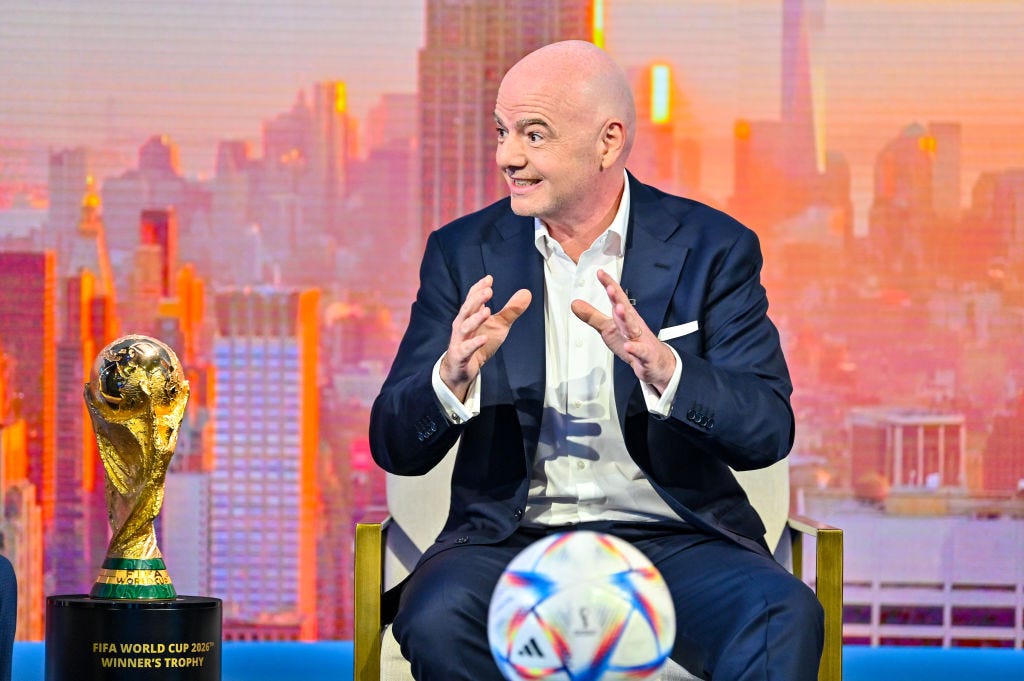Friday Newsletter: FIFA Considering Four-Team Groups for World Cup 2026
Change would remove disastrous collusion possibilities with three-team groups and provide more revenue for FIFA with 104 games instead of 80

When World Cup 2026 comes to the United States, Mexico and Canada, the tournament will expand from 32 to 48 teams. We already know this. But a big question all along has been: How will the format work? FIFA has said to this point that World Cup ‘26 will depart from the format we have grown accustomed to (with four-team groups) and have 16 opening-stage groups with three teams in each one.
Indeed, everyone during the recent FIFA show revealing the ‘26 host cities talked about the tournament having 80 total games (the number that would go with having three teams in each group).
But there’s an obvious giant problem with groups of three: You can’t play simultaneous games on the group’s final matchday, which could encourage teams to agree to play to a mutually-beneficial result—as we saw in the infamous Disgrace of Gijón in 1982, when Germany beat Austria 1-0, allowing both teams to advance at the expense of Algeria. That game caused FIFA to move to the simultaneous final-matchday group games that we’ve gotten used to over the years.
Three-team groups at World Cup 2026 are a collusion disaster waiting to happen. But the good news is that they may not come to pass after all. CONCACAF president Victor Montagliani told Martyn Ziegler of The Times of London in April that “I don’t think 16 groups of three is set in stone,” and a source with knowledge of the situation tells me that FIFA is now considering having 12 groups of four teams each for World Cup ‘26.
GrantWahl.com is a reader-supported soccer newsletter. Quality journalism requires resources. The best way to support me and my work is by taking out a paid subscription now. Free 7-day trials are available.
What would that mean for the tournament? For starters, there would be 104 total games instead of 80. But that would also mean more revenue for FIFA, which is always, always seeking more revenue. Yes, you would likely need to stage six group-stage games a day (instead of the four per day that we’ll see in Qatar this year), but that’s doable. With four-team groups, the biggest benefit would be that you’d have simultaneous final-matchday games within the group and ensure a sense of fairness that would be far better than what could result from three-team groups.
The one bummer with the new plan would be that you would have third-place group teams advancing to the knockout rounds, an annoying trend that we’ve already seen with the expansion of the men’s Euros from 16 to 24 teams. Truth be told, if the men’s World Cup has to expand beyond 32 teams, I’d rather have it go to 64 than to 48; at least that way you’d make the group stage more meaningful with only the top two finishers in each four-team group advancing.
But the plan FIFA is now considering for ‘26 with four-team groups is at least a preferable option to three-team groups, and the added revenue for FIFA means it has a chance of happening.
OPENING THE MAILBAG
Would Christian Pulisic be a good fit at Juventus? And if he ends up there, is McKennie still on the squad with Pogba returning?
ML
It’s striking how many USMNT players may still be on the move from their clubs this summer, including Zack Steffen, Chris Richards, Sergiño Dest, Tyler Adams, McKennie and Pulisic. And that doesn’t include guys who’ve already moved like Matt Turner, Jordan Pefok and Brenden Aaronson. I still think it’s unlikely that Pulisic will move from Chelsea this summer for a couple reasons: 1) There’s a new American owner, and having the most prominent American leave would seem weird, and 2) Pulisic’s salary is high enough at Chelsea that I’m not sure many other clubs would want to pay it. For his part, McKennie didn’t exactly play down the possibility of moving from Juventus when he was asked about it during the USMNT camp last month. I think he’d be more likely to move than Pulisic would.
Short term, how does the acquisition of Sydney Leroux impact Angel City FC? What will the likely lineup be up front? Medium to long term, what does this mean for Angel City if and when they get back Press and potentially the 2023 draft?
Diego
Angel City is off to a good start, and the spot they needed to upgrade was center-forward, which the Leroux acquisition does. I think Leroux and Press could co-exist just fine once Press is back from her ACL injury. The question is do you want to play two strikers up top or have one centerforward and two wingers? I like Simone Charley and Jun Endo with Leroux. Could you theoretically find a way to play all three and Press once she’s back? That might be rolling the dice a bit too much.
Who are some of the names on the U.S. Under 20’s that we should be looking to see on the national team in the future?
Jeffrey Kaiser
Some of the guys I’ve enjoyed watching are Paxten Aaronson (Brenden’s brother), Diego Luna, Caden Clark and Mauricio Cuevas. I like Cade Cowell as a prospect too. He’s suspended, unfortunately, after the postgame altercation the other night with Costa Rica.
What’s your opinion on Zack Steffen possibly going out on loan to Championship side Middlesbrough?
Lou Hudson
From a USMNT perspective, I think it’s great that Steffen might get starter’s playing time in the months before the World Cup. We knew that wasn’t going to happen with Man City. It’s kind of crazy when you think about it, but I remember writing that we might see a Lorius Karius situation with Steffen and City after his big mistake in a high-profile FA Cup semifinal against Liverpool. And it may end up being like Karius with Steffen never playing for the club again after that day.
For all the questions about the #9, CB, backup LB, etc., it's seemed like we haven't talked much about the MNT's problems scoring off set pieces. Our only non-PK set piece goals in WCQ came from Acosta, who'll probably start one match at most in the World Cup group stage. What do you think the answer is there, and could you share any insight you have on Lars Knudsen, who was hired as "Set Piece Coach" earlier this week?
thew1242
I absolutely love the Knudsen hire. He spent two years with the Danish club Midtjylland, which has pioneered the innovation of set-pieces and maximizing them to score goals. The hire isn’t that surprising; Gregg Berhalter is a big data analysis guy, and he has to know plenty about 1) the success of Knudsen and Midtjylland with set-pieces, and 2) the surprising lack of success on set-pieces that the USMNT had during World Cup qualifying. Look for intriguing things to happen in this area.
What are the reasons why the confederations don't cooperate to stagger the timing of their summer tournaments? Instead of utilizing the past 3 weeks of dead time on the soccer calendar, the Women's UEFA, CONMEBOL, AFCON and CONCACAF tournaments are all starting over the next week. It's a repeat of 2019, when the Women's World Cup, Copa América and Gold Cup all had their finals on the same day. Instead of overlapping with one another, why not stagger timing in order to maximize attention, viewership and revenue?
Thomas
It all has to do with the club game and the FIFA international calendars, which are different for the women’s game than they are for the men’s game. But the fact that a women’s calendar exists does mean that you’re going to see women’s continental tournaments taking place at around the same time. Which reminds me, I’m fired up for women’s Euros and the CONCACAF women’s World Cup qualifying tournaments to start this week—the schedule reminds me a little bit of when the men’s Euros take place during the afternoon and the Copa América at night.
Have a good holiday weekend!





I think a format that solves most problems is 12 groups of four, with only the top two in each group advancing (so only 24 teams go to the knockout phase)--no third place teams. Of these 24 teams, the 9th-24th best go into a 16-team first round, with the 8 winners moving on to play the top 8 group winners (based on points), who will have been given a bye into a 16-team second round.
This puts the total number of games in the World Cup at 96 (instead of 104), keeps it so only second-place teams advance, and reduces those final round conflicts of interest in the group phase.
A 64-team World Cup would make qualifying almost meaningless. The whole “octo” would go through from CONCACAF? 6 of the 8? It’d certainly give FIFA what they want - $ - but at the expense of the game.
But if it goes through, you could condense scheduling by just having each group play all its games at the same time, like the final group games are scheduled now.